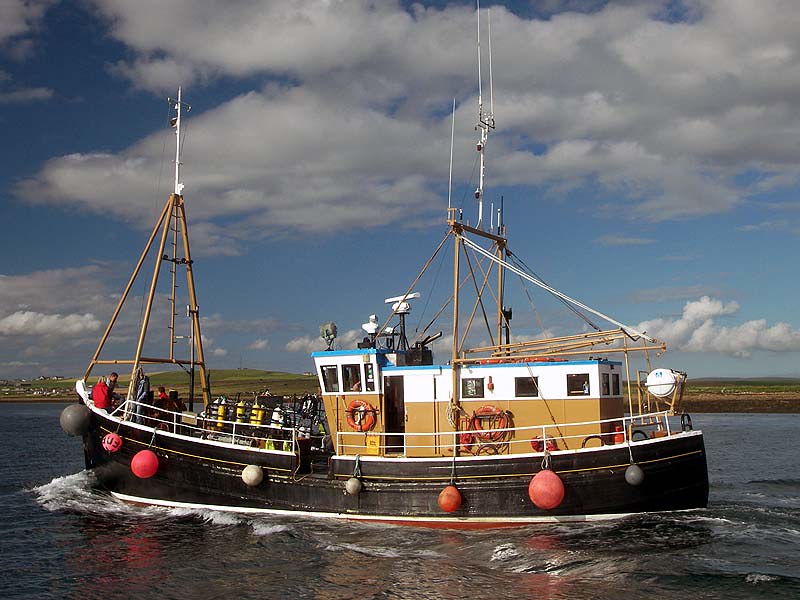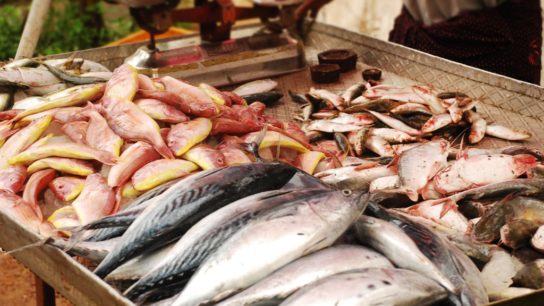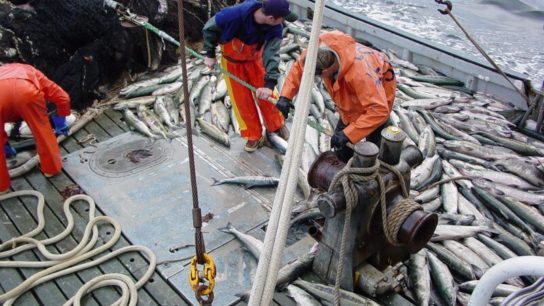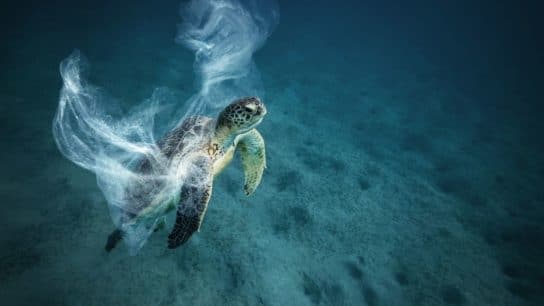In recent years, illegal fishing has accounted for at least 20-50% of the global catch, leading to plummeting fish stocks. This unscrupulous robbing of the livelihoods of local fishermen also has a human cost, as the industry profits off the backs of migrant workers, many of whom are in debt bondage.
—
Global fish stocks have been plummeting due to illegal, unreported and unregulated (IUU) fishing in many maritime regions of the world. Satellite imagery has revealed fleets of fishing boats plundering various coasts around the world, particularly in developing nations, many of which are located in exclusive economic zones and territories that do not have strict regulated control structures for fisheries.
Currently, nearly 20% of all IUU activities take place in West African nations such as Mauritania, Senegal, Gambia, Cape Verde and Sierra Leone, where industrial fleets target areas that have been traditionally reserved for small-scale fishing communities. In these nations, IUU fishing is estimated to account for up to 40% of all fish caught! IUU activities are also prevalent in the Galapagos, where Chinese fishing fleets were recently found to be scooping up sea life in the marine biodiversity hotspot just outside the 200-mile legal zone. This in itself is not illegal, but when local authorities attempted to apprehend the vessels, they turned their tracking systems off to avoid being spotted, which is not allowed.
Other affected nations include Indonesia, where government authorities have admitted how difficult it is to track IUU vessels due to the country’s many islands and archipelagos. Various nations in the Western Central Pacific Ocean, such as Palau, Micronesia, and the Marshall Islands, also have high rates of IUU fishing for similar reasons.
To cut costs, IUU fleets often employ underpaid migrant workers from Southeast Asia and Africa, many of whom are subject to frequent physical and verbal abuse. Kaohsiung, Taiwan, and Cape Town, South Africa, are key connection hubs for the movement of these forced labourers. Forced to work up to 20 hours a day, many migrant workers have no choice but to continue working, since they are often in debt bondage. This means that they are forced to work to repay transportation from one port to another. The only way these labourers can get out of debt bondage is to work until the crew captains have deemed that they have worked enough. Oftentimes, this means they will work indefinitely, until they manage to escape or are rescued. The UN has declared this to be a form of slavery.
You might also like: Book Review: Ocean of Life: The Fate of Man and the Sea
IUU fishing is attractive because of the lack of taxes or duties. As such, IUU fleets often target expensive species such as salmon and lobster (inexpensive species like cod are also targeted due to their popularity), which are already overexploited by legal fisheries and are often subject to taxes and restrictions. By turning off their transponders, fleets can take as many fish as they want without the fear of getting caught. Only affluent nations such as Norway, for instance, can afford strict controls in the waters under their jurisdiction and utilise satellite and camera technology to detect illicit fishing.
Enacted in 2009, the Food and Agriculture Organization (FAO)’s Agreement on Port State Measures to Prevent, Deter and Eliminate Illegal, Unreported and Unregulated Fishing (PSMA) was the first international treaty designed to prevent and suppress IUU fishing. The US then established the Seafood Import Monitoring Program in December 2016 to address IUU fishing products entering the market.
Accordingly, Australian and American fleets have started using cameras combined with machine learning to spot suspicious behaviour and identify species of fish that should not be there (i.e., species from no-catch zones). These species are identified and recorded so they can be compared to what fishers report in their logbooks, which, along with other gathered information, will be used to map, track, and disrupt IUU fishing and prevent and stop the movement of forced labourers.
No-catch zones – which are marine protected areas that bar fishing, mining, drilling and other potentially exploitative activities – may also be useful in preventing IUU fishing. However, studies have revealed that the usefulness of no-catch zones is largely dependent on whether the pattern of fish dispersal is density dependent. When population density is high due to restrictions on fishing, this may increase competition for food or space, thereby affecting traits such as body growth, reproductive patterns and mortality, as well as encouraging fish to disperse to other (i.e., less competitive) areas outside of the no-catch zones.
As a result, when the pattern of fish dispersal in a no-catch zone is density dependent, stricter controls on IUU fishing in reserves or in legal fishing areas may actually increase the aggregate level of illegal fishing. This is particularly the case “in a fishery where illegal fishing can only be partially controlled.” Accordingly, researchers and policy-makers must take into account the effects of density dependence when determining how useful no-catch zones would be in preventing IUU fishing.
One thing is for certain – the global community needs to work together to address the systemic issues that cause IUU fishing. The Pew Charitable Trusts has developed an international conservation program that aims to promote better fishing practices and end IUU fishing. They have suggested a global system that will help to provide a cost-effective way for developing and developed nations alike to “identify, monitor, deter and prosecute [those who ultimately benefit from and support] illegal fishing.”
This enforcement system is currently in the works. It will require all fishing vessels that operate in waters beyond national jurisdiction to have satellite transponders and unique vessel identification numbers, ensure countries implement port state controls consistent with the PSMA, and establish ways for the food service sector to identify and prevent ill-gotten fish from entering the supply chain.
As Pew strengthens and builds more partnerships with governments, industries, and NGOs, we will move closer to curbing IUU fishing.
Featured image by: Flickr


















